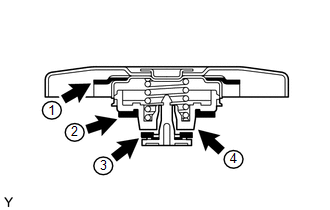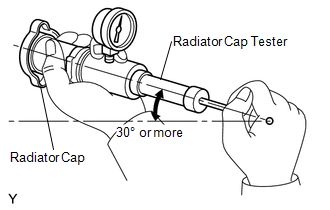Toyota Venza: On-vehicle Inspection
ON-VEHICLE INSPECTION
PROCEDURE
1. CHECK RADIATOR CAP SUB-ASSEMBLY
(a) Measure the valve opening pressure.

(1) If there are water stains or foreign matter on rubber packings 1, 2 or 3, clean the part(s) with water and finger scouring.
(2) Check that rubber packings 1, 2 and 3 are not deformed, cracked or swollen.
(3) Check that 3 and 4 are not stuck together.
(4) Apply engine coolant to rubber packings 2 and 3 before using the radiator cap tester.
|
(5) When using the cap tester, tilt it to 30° or more above level. |
|
(6) Pump the cap tester several times, and check the maximum pressure*.
Pump speed:
1 pump per second
*: Even if the cap cannot maintain the maximum pressure, it is not a defect.
Judgment Criterion:
|
Item |
Specified Condition |
|---|---|
|
Standard value (for brand-new cap) |
94 to 122 kPa (1.0 to 1.2 kgf/cm2, 13.6 to 17 psi) |
|
Minimum standard value (for used cap) |
79 kPa (0.8 kgf/cm2, 11.4 psi) |
If the measured maximum pressure is less than the minimum standard value, replace the radiator cap sub-assembly.
 Components
Components
COMPONENTS
ILLUSTRATION
ILLUSTRATION
ILLUSTRATION
...
 Installation
Installation
INSTALLATION
PROCEDURE
1. INSTALL RADIATOR ASSEMBLY
(a) Install the fan assembly with motor to the radiator with the 2 guides
at the bottom and 3 snap fits on the top.
Text in Ill ...
Other materials about Toyota Venza:
Front Sensor Communication Malfunction (C1AEC)
DESCRIPTION
This DTC is stored when there is an open or short circuit in the communication
line between the front sensors and the ECU, or when there is a malfunction in a
front sensor.
DTC No.
DTC Detection Condition
Trou ...
Door Control Transmitter(w/ Smart Key System)
Components
COMPONENTS
ILLUSTRATION
Removal
REMOVAL
PROCEDURE
1. REMOVE TRANSMITTER BATTERY
Inspection
INSPECTION
PROCEDURE
1. INSPECT DOOR CONTROL TRANSMITTER
(a) Inspect operation of the transmitter.
(1) Remove the battery (lithium batt ...
Malfunction in Deceleration Sensor (C0365/28,C1234/34,C1245/32,C1245/45)
DESCRIPTION
The skid control ECU receives signals from the yaw rate and acceleration sensor
via the CAN communication system.
The yaw rate sensor has a built-in acceleration sensor.
If there is trouble in the bus lines between the yaw rate and acceleratio ...
0.1325

